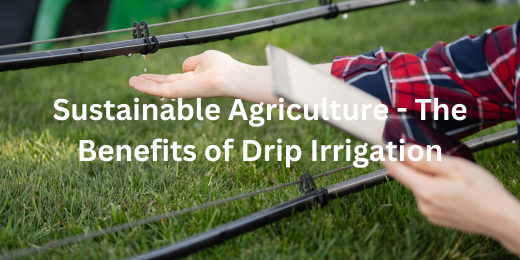
Sustainable Agriculture – The Benefits of Drip Irrigation
Benefits of drip irrigation
Introduction to Sustainable Agriculture
Sustainable agriculture focuses on farming methods that protect the environment, support economic profitability, and maintain social equity. Sustainable agriculture fosters a holistic approach to food production, ensuring practices that minimize resource depletion and promote thriving ecosystems for a healthy and productive future. In South India, it is crucial due to the region’s agricultural dependence.
One of the significant benefits of drip irrigation is its water efficiency, which is vital for areas with limited water resources. This method delivers water directly to the plant roots, minimising wastage. Implementing sustainable irrigation methods like this can help farmers save water and reduce costs.
Incorporating sustainable agriculture practices enhances crop yield and promotes soil health. These methods also reduce the need for chemical inputs, benefiting the environment. For South Indian farmers, adopting such practices can lead to long-term sustainability and improved livelihoods.
Understanding Drip Irrigation
Drip irrigation technology involves delivering water directly to the roots of plants through a network of tubes and emitters. This method was developed to maximise water efficiency and minimise waste. Due to its numerous advantages in water conservation and efficient resource management, drip irrigation has seen a remarkable surge in adoption by farmers worldwide in recent years.
The historical evolution of sustainable irrigation methods, such as drip irrigation, commenced during the 1960s, marking a pivotal period for innovations in water-efficient agricultural practices. These methods have evolved to address the challenges of water scarcity and increasing agricultural demands. In South India, adoption rates have risen significantly due to these benefits.
Farmers in South India are increasingly acknowledging the benefits of drip irrigation, appreciating its ability to enhance crop yields, conserve water resources effectively, and sustainably manage agricultural practices. This technique helps them conserve water, reduce labour, and increase crop yields. By embracing sustainable agriculture practices, they are improving productivity and ensuring the long-term viability of their farming operations.
Water Conservation
One of the major benefits of drip irrigation is its efficient water use compared to traditional methods. Delivering water precisely to plant roots, drip irrigation minimizes waste and maximizes efficiency. This precision reduces water wastage significantly, making it an ideal solution for farming.
In drought-stricken regions, adopting water-saving irrigation technologies like drip irrigation is an essential strategy to ensure crop viability and agricultural sustainability. These methods help conserve precious water resources, ensuring that crops receive adequate hydration even during dry periods. By utilizing drip irrigation, farmers achieve optimal crop yields while significantly reducing their water consumption.
For regions like South India, facing chronic water challenges, implementing sustainable agricultural practices is critical to ensure long-term food security and environmental well-being. In drip irrigation, water is delivered directly to plant roots, promoting sustainable agriculture through efficient resource utilization and water conservation. This approach not only enhances crop yields but also ensures long-term agricultural sustainability.
Enhanced Crop Yield
Drip irrigation ensures precise water delivery directly to plant roots, optimising hydration and nutrient absorption. This method enhances crop yield by providing plants with the exact amount of water they need, leading to healthier growth and improved overall productivity.
By facilitating sustainable irrigation methods, such as drip irrigation, farmers can enhance nutrient uptake in crops. By fostering healthier soil ecosystems and promoting natural nutrient cycling, sustainable practices cultivate more robust plants with increased resistance to pests and diseases. The efficiency of this irrigation technique contributes to higher yields per hectare of cultivated land.
In the realm of sustainable agriculture, adopting drip irrigation can significantly boost crop productivity. This method not only conserves water but also promotes sustainable farming practices by reducing the environmental impact of excessive water use. Farmers benefit from increased yields while contributing to long-term agricultural sustainability.
Cost-Effectiveness
Drip irrigation offers significant cost-effectiveness benefits for farmers. It leads to long-term savings on water bills by optimising water usage, ensuring that only necessary amounts are delivered directly to plant roots, minimising wastage.
Additionally, this sustainable irrigation method reduces labour costs as it automates the watering process, freeing up farmers’ time for other agricultural activities. Despite the initial investment in setting up drip irrigation systems, the long-term benefits outweigh the costs.
In the context of sustainable agriculture, drip irrigation proves to be economically viable. It not only saves money but also supports environmental sustainability by conserving water and reducing the need for chemical inputs, aligning with long-term agricultural goals.
Environmental Impact
Drip irrigation has a positive environmental impact by significantly reducing soil erosion. By delivering water directly to plant roots, it minimises runoff and soil disturbance, preserving the integrity of agricultural land and preventing erosion.
Implementing sustainable irrigation methods like drip irrigation also reduces the need for chemical fertilisers. This approach promotes soil health and biodiversity by minimising chemical runoff into nearby water bodies, thereby benefiting local ecosystems and wildlife.
In the realm of sustainable agriculture, drip irrigation plays a crucial role in environmental stewardship. It supports biodiversity and ecosystem health by conserving water resources and reducing the environmental footprint of agricultural practices, ensuring a balanced and sustainable approach to farming.
Explore the world of organic farming and products by visiting your nearest Uyir Organic Farmers Market, or browse our selection online at www.uyironline.in or www.uyirorganic.farm for comprehensive information and quality organic offerings.